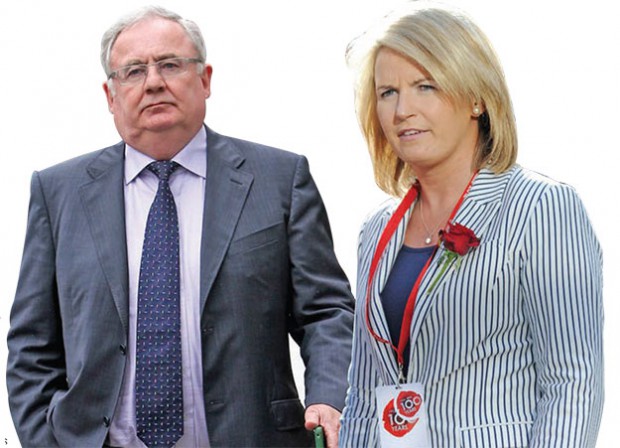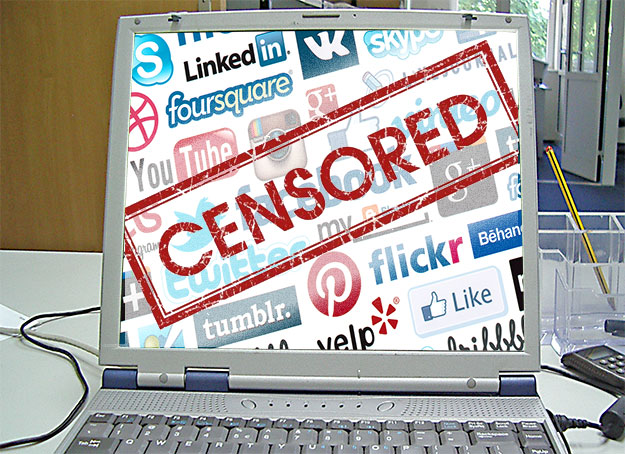1 July 2015 Edition
Labour’s new online censorship proposals
Dáil Bills so vague they could be used to stifle legitimate criticism of Government or politicians across social media

• Labour TD Pat Rabbitte and Senator Lorraine Higgins
Digital Rights Ireland notes that online bullying is already covered by two pieces of legislation
TWO DÁIL BILLS proposed by the Labour Party purportedly aimed at curbing online ‘trolls’ (including provision for offenders to be locked-up for ‘offensive’ messages) are so vague that they could be used to stifle legitimate criticism of the Government or politicians across social media platforms.
Galway Senator Lorraine Higgins says that her Harmful and Malicious Electronic Communications Bill 2015 “aims to protect against and mitigate harm caused to individuals by all or any digital communications, and to provide such individuals with a means of redress for any such offending behaviours directed at them”.
Meanwhile, Labour former Communications Minister Pat Rabbitte has published a separate Public Electronic Communications Network (Improper Use) Bill.
Higgins’s Bill describes a “malicious communication” as “an electronic communication where it intentionally or recklessly causes alarm, distress or harm to the other” and says a person found guilty of such an offence could face a fine of €5,000 or imprisonment for up to 12 months.
Pat Rabbitte’s Bill plans to make it an offence for anybody who sends a message “known to be false” or “persistently” sends messages for the “purpose of causing annoyance, inconvenience or needless anxiety to another".
The vagueness of these proposals should sound alarm bells to social media users and anti-censorship campaigners, according to leading digital rights organisations. Lorraine Higgins says she was prompted to produce this legislation after she was targeted by online trolls during last year’s European elections. Unfortunately, abuse of politicians and celebrities online is widespread. A cursory glance at the Twitter feed of Gerry Adams shows this. However, most politicians adhere to the rule of ‘Don’t feed the trolls’ and simply ignore them or block them if they persistently clutter their timeline.
In situations of threats or constant harassment, current legislation is already in place to deal with such issues. New laws are simply not necessary.
To show how ridiculous but far-reaching these proposals are, under her own party’s Bills, Lorraine Higgins could retrospectively find herself in trouble.
During the 2014 European elections she took aim at Independent candidate Luke ‘Ming’ Flanagan, issuing tweets depicting a poorly photo-shopped version of him as Dustin the Turkey with the strapline “Don’t send another turkey to Europe”. This surely qualifies as an attempt to “intentionally cause distress” to her opponent.

Digital Rights Ireland, an organisation dedicated to defending civil rights in a digital age, has responded to these recent online censorship Bills and warns of the repercussions they could have for free speech:
“In a judgment handed down in March, the Indian Supreme Court struck down as unconstitutional a law very similar to some proposals for the Irish Internet. It found that the law, by criminalising “grossly offensive”, “menacing” and “annoyance” messages, had a chilling effect on freedom of expression and lent itself to abuse by politicians and others to silence criticism,” the organisation said.
Digital Rights Ireland notes that online bullying is already covered by two pieces of legislation: the Prohibition to Incitement of Hatred Act and the Non-Fatal Offences Against the Person Act and say that the main shortfall is not the laws themselves but the failure to enforce them – with gardaí often not taking reports of online abuse seriously or being unsure of how to proceed:
“Two offences exist which are already technology-neutral and can apply to online communication. Better enforcement of these laws will safeguard freedom of expression and privacy online while allowing ample scope for prosecution against those bullying and harassing others online.”
Sinn Féin Communications spokesperson Michael Colreavy told An Phoblacht:
“As legislators, it is not our job to suffocate social media but instead work with the industry in an attempt to make social media as user-friendly as possible.”
Noting that bullying was a common problem before the digital age, he says greater supports are needed, particularly in schools, to provide clear guidelines and protocols on how to deal with reports of cyber bullying.
“We’ve seen from the Right2Water movement, as well as movements in other countries, how social media can be used in a positive way by ordinary people to effect social change. It is essential that the public can access and use social media as a means of expression and organisation.”




